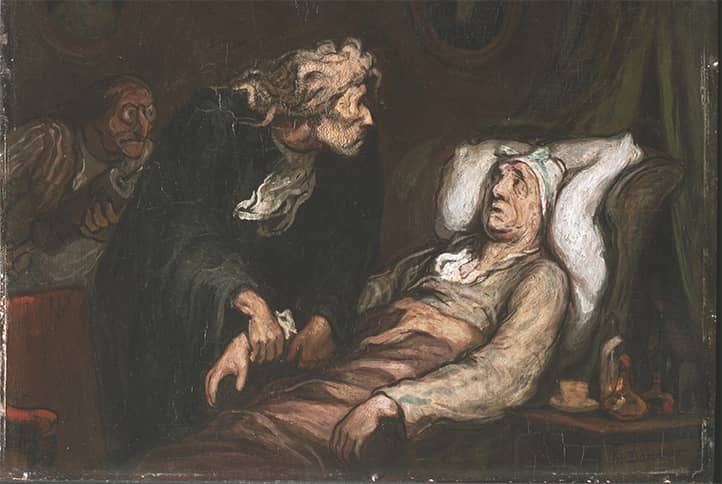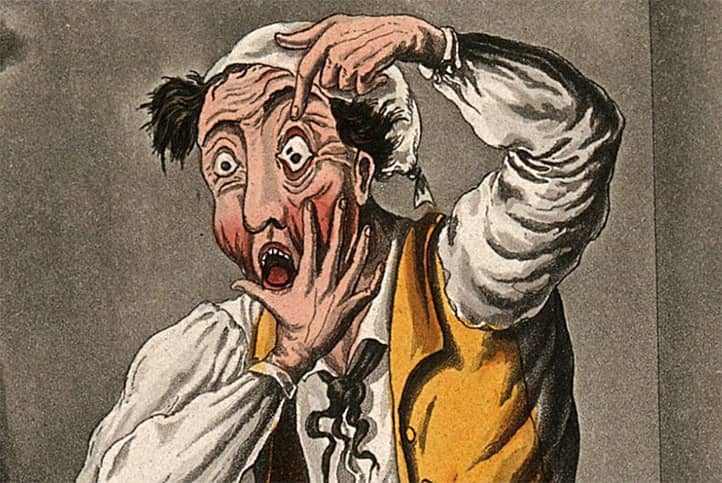In today’s world, where health information is just a click away, hypochondria is becoming more common. This condition is characterized by excessive worry about one’s health, often without objective cause. But is hypochondria merely an exaggerated sense of worry, or is it a serious disorder that requires professional attention?

What is Hypochondria?
Hypochondria, also known as hypochondriacal disorder, is a mental condition in which a person experiences excessive and unreasonable worry about their health. People with hypochondria often interpret minor physical sensations or normal bodily functions as signs of severe illness.
Key characteristics of hypochondria include:
- Constant worry about having a serious illness.
- Inability to be reassured, even after medical examinations.
- Excessive focus on minor physical symptoms.
- Frequent doctor visits, or conversely, avoidance of medical help out of fear of “bad news.”
- Constant search for information on diseases in online or medical literature.
It is important to note that hypochondria is not merely excessive health concern. This condition can significantly affect a person’s quality of life, work performance, and social relationships.
Etymology
The term “hypochondria” has deep historical roots. It originates from the Ancient Greek word “hypochondrios,” where “hypo” means “under” and “chondros” refers to “the cartilage of the chest.” In ancient times, it was believed that the organs located in the upper abdomen (under the rib cartilage) were responsible for melancholy and other mental disorders.
Historical Reference:
- In ancient times, Hippocrates and Galen used the term “hypochondria” to describe a condition associated with digestive problems and melancholy.
- During the Middle Ages, hypochondria was often linked to “black bile”—one of the four humors in the body, according to the theories of the time.
- In the 17th-18th centuries, hypochondria was known as “the English disease” due to its prevalence among the English aristocracy.
- Only in the 19th-20th centuries did hypochondria begin to be understood as a mental disorder in its modern sense.

Types of Hypochondriacal Disorder
Hypochondriacal disorder can manifest in various forms. Main types include:
Primary Hypochondria
This form of the disorder is characterized by fear of illness or a strong belief in having a serious disease, which arises without any clear external cause. A person may experience health-related anxiety even in the absence of symptoms or medical indications.
Characteristics of Primary Hypochondria:
- Constant worry about health without objective reasons.
- Tendency to interpret normal bodily sensations as signs of illness.
- Frequent shifting of health concerns from one disease to another.
Secondary Hypochondria
This type of hypochondria develops against the background of existing medical or psychological problems. For instance, a person who has suffered a serious illness may develop an excessive fear of its recurrence or the emergence of new diseases.
Features of Secondary Hypochondria:
- Connection with real experience of illness or trauma.
- Often accompanies other mental disorders, such as depression or anxiety disorders.
- May be more resistant to treatment due to its connection with actual medical experience.
Other Forms
- Nosophobia: Fear of a specific disease or group of diseases (e.g., cancerophobia—fear of cancer).
- Cyberchondria: A modern form of hypochondria, associated with excessive searching for medical information online and self-diagnosis based on internet data.
- Hypochondria with Predominance of Somatic Symptoms: In this case, a person not only fears illness but also experiences real physical symptoms, which, however, have no organic cause.
Understanding the various forms of hypochondriacal disorder is crucial for accurate diagnosis and selection of the most effective treatment approach.

Symptoms of Hypochondria
Hypochondria manifests through a complex of psychological and physical symptoms, which can significantly impact a person’s quality of life. Recognizing these symptoms is a key step towards accurate diagnosis and treatment.
Psychological Symptoms
- Constant worry about health: The person spends much of their time thinking about possible illnesses.
- Obsessive thoughts about diseases: Inability to divert attention from thoughts of potential illnesses.
- Fear of serious illnesses: Frequent fears of having severe or life-threatening diseases.
- Distrust of medical conclusions: Doubts about the competence of doctors or the accuracy of diagnostic tests.
- Increased anxiety: General state of tension and worry.
- Depressive states: Low mood associated with constant thoughts about diseases.
- Social isolation: Avoidance of social contacts out of fear of contamination or shame over their condition.
Physical Manifestations
While hypochondria is a mental disorder, it can produce real physical symptoms:
- Rapid heartbeat: Especially when thinking about illnesses.
- Excessive sweating: As a reaction to health anxiety.
- Headaches: Often related to constant tension.
- Muscle pain and tension: Result of chronic stress.
- Sleep disturbances: Difficulty falling asleep or frequent awakenings.
- Digestive issues: Nausea, upset stomach.
- Dizziness and weakness: Can be a consequence of constant anxiety.
Understanding the symptoms of hypochondria is important not only for timely diagnosis but also for recognizing the need for professional help. Early detection and treatment can significantly improve the prognosis and quality of life for those suffering from this disorder.

Causes of Hypochondria
Hypochondria is a complex disorder that arises from the interaction of various factors. Understanding these causes is important for effective prevention and treatment.
Psychological Factors
- Childhood experiences: Traumatic health-related experiences in childhood can lead to the development of hypochondria in adulthood.
- Personality traits: Anxiety, perfectionism, and a tendency toward negative thinking increase the risk of developing hypochondria.
- Stress and traumatic events: Severe stress or traumatic situations can trigger hypochondriacal symptoms.
- Cognitive distortions: Tendency to interpret physical sensations as signs of serious illnesses.
- Low self-esteem: May lead to heightened focus on health as a way to attract attention or validate oneself.
Biological Factors
- Genetic predisposition: Studies show that hypochondria may have a hereditary component.
- Neurobiological features: Disruptions in the functioning of neurotransmitters, especially serotonin, may play a role in the development of hypochondria.
- Increased sensitivity to bodily sensations: Some people are naturally more sensitive to their physical sensations, which can lead to excessive health anxiety.
- Chronic illnesses: Having real health problems can act as a trigger for the development of hypochondria.
Social Factors
- Cultural characteristics: In some cultures, increased attention to health is encouraged, increasing the risk of hypochondria.
- Media influence: Constant coverage of medical topics and epidemics in the media can heighten health fears.
- Availability of medical information: Easy access to medical information on the internet can lead to self-diagnosis and increased health anxiety.
- Social learning: Observing the behavior of others who are overly concerned about their health may serve as a model for developing hypochondria.
- Professional environment: Working in the medical field or frequent contact with information about diseases can increase the risk of hypochondria.
Understanding the multifactorial nature of hypochondria helps in developing comprehensive approaches to its treatment and prevention. It is important to consider the individual combination of these factors for each patient when planning therapy.

Who is Prone to Hypochondria?
While hypochondria can develop in anyone, certain risk factors and groups of people are more predisposed to this disorder.
Risk Factors
- High levels of anxiety: People with anxiety disorder are more prone to hypochondria.
- Depressive states: Depression often accompanies hypochondria and can be a risk factor.
- Obsessive-compulsive disorder: The tendency toward obsessive thoughts and rituals can increase the risk of hypochondria.
- Experience of serious illnesses: People who have suffered severe illnesses or have chronic conditions are more likely to develop hypochondria.
- Family history: Having hypochondria or other mental disorders in the family may increase the risk.
- Traumatic experiences: Past traumas, especially health-related, can act as triggers for hypochondria.
- High stress levels: Prolonged exposure to stress can contribute to the development of hypochondriacal symptoms.
At-Risk Groups
- Young adults: Hypochondria is more commonly developed between the ages of 20 and 30.
- Healthcare workers: Paradoxically, people working in healthcare are more prone to hypochondria due to constant exposure to information about diseases.
- People with chronic illnesses: Constant attention to one’s health can develop into hypochondria.
- Individuals who have lost loved ones due to illness: Fear of repeating a tragedy can lead to excessive concern about one’s own health.
- People with heightened sensitivity to bodily sensations: Hypersensitivity to physical symptoms can set the ground for hypochondria.
- Individuals with low self-esteem: Insecurity may manifest as excessive worry about health.
- People who abuse alcohol or drugs: Dependencies often accompany mental disorders, including hypochondria.
Understanding risk factors and groups most prone to hypochondria is important for early diagnosis and prevention of this disorder. However, it is essential to remember that the presence of one or more risk factors does not guarantee the development of hypochondria.

Diagnosis of Hypochondriac Disorder
Diagnosing hypochondria is a complex process that requires thorough medical and psychological evaluation. It’s essential to distinguish hypochondria from actual medical issues and other mental disorders.
Diagnostic Methods
- Clinical Interview: A detailed conversation with the patient about their symptoms and lifestyle.
- Psychological Tests: Specialized questionnaires to assess levels of anxiety and other psychological factors.
- Medical Examination: To rule out real physical illnesses.
- Medical History Analysis: Reviewing previous medical records and examination results.
- Behavioral Observation: Assessing the patient’s reactions to medical information and procedures.
- Consultations with Other Specialists: For a comprehensive assessment of the patient’s condition.
Criteria for Diagnosis
According to the Diagnostic and Statistical Manual of Mental Disorders (DSM-5), the following criteria must be met to diagnose hypochondria:
- Excessive worry about having or being at risk of a serious illness.
- Somatic symptoms are either absent or, if present, are mild.
- High level of anxiety about health.
- Excessive health-related behaviors (e.g., frequent body checks) or maladaptive avoidant behavior.
- Health-related worry has persisted for at least six months.
- The concern is not better explained by other mental disorders.
It is important to note that the diagnosis of hypochondria should only be made by qualified mental health professionals.

Treatment of Hypochondria
Treating hypochondria requires a comprehensive approach that combines various therapeutic methods. The goal is not only to reduce symptoms but also to help the patient develop a healthier attitude toward their body and health.
Psychotherapeutic Methods
- Cognitive Behavioral Therapy (CBT):
- Helps identify and change negative thought patterns.
- Teaches anxiety management techniques.
- Encourages a more realistic perception of health.
- Exposure Therapy:
- Gradual and controlled exposure to situations that trigger health-related anxiety.
- Helps reduce sensitivity to anxious thoughts about illnesses.
- Mindfulness Therapy:
- Teaches awareness and acceptance of bodily sensations without overreacting to them.
- Helps reduce overall anxiety levels.
- Psychodynamic Therapy:
- Explores the deep-rooted causes of hypochondria related to past experiences.
- Helps resolve internal conflicts that contribute to the disorder.
Medication Treatment
While psychotherapy is the main treatment for hypochondria, medication may be recommended in some cases:
- Antidepressants:
- Selective serotonin reuptake inhibitors (SSRIs) help reduce anxiety and obsessive thoughts about health.
- Examples: fluoxetine, paroxetine, sertraline.
- Anxiolytics:
- Prescribed for short-term relief of acute anxiety symptoms.
- Use should be limited due to the risk of dependency.
- Antipsychotics:
- In rare cases, low doses of antipsychotic drugs may be prescribed if psychotic symptoms are present.
Comprehensive Approach
The most effective approach is a combination of:
- Regular psychotherapy sessions.
- Medication (if necessary).
- Training in relaxation techniques and stress management.
- Physical exercise and a healthy lifestyle.
- Group therapy or support groups.
- Family involvement to create a supportive environment.
It is important to emphasize that hypochondria treatment is an individualized process, and the treatment plan should be tailored to the specific needs and characteristics of each patient.

Can Hypochondria Be Self-Treated?
The question of self-treatment for hypochondria often arises among people suffering from this disorder. While professional help is a key factor in treatment, there are certain steps a person can take to improve their condition on their own.
Self-Help Strategies
- Education: Learning accurate information about hypochondria can help one better understand their condition and reduce anxiety.
- Relaxation Techniques:
- Meditation;
- Deep breathing;
- Progressive muscle relaxation.
- Keeping a Journal: Recording thoughts and feelings helps identify anxiety triggers and track progress.
- Physical Exercise: Regular physical activity helps reduce overall stress and anxiety levels.
- Limiting Medical Information Searches: Setting limits on time spent searching for symptoms online.
- Social Support: Communicating with friends and loved ones helps divert focus from obsessive health thoughts.
- Healthy Lifestyle: Proper nutrition, sufficient sleep, and avoiding harmful habits contribute to overall well-being.
Limitations of Self-Treatment
Despite the benefits of self-help, it is essential to understand its limitations:
- Difficulty in Objective Assessment: It can be challenging for someone with hypochondria to assess the severity of their condition objectively.
- Risk of Symptom Worsening: Incorrectly chosen self-help methods can increase anxiety.
- Lack of Professional Support: Self-treatment cannot replace qualified psychotherapeutic assistance.
- Difficulty in Identifying Deep-Seated Causes: It’s hard to identify and work through the root of the problem without a specialist.
- Possibility of Missing Real Medical Conditions: By focusing on self-treatment for hypochondria, a person may ignore real symptoms that require medical attention.
While self-help methods can be useful for managing hypochondria symptoms, they are most effective when combined with professional treatment. Self-directed efforts should be seen as a supplement to therapy rather than a replacement.

How to Relieve a Hypochondria Attack?
Hypochondria attacks can be intense and cause significant discomfort. While complete relief from such episodes often requires long-term therapy, certain methods can help alleviate acute symptoms.
Self-Soothing Techniques
- Breathing Exercises:
- Diaphragmatic breathing: Inhale for a count of 4, hold for 4, exhale for 4.
- Box breathing: Inhale, hold, exhale, and hold again, each for 4 seconds.
- Mindfulness and Meditation:
- Focus on the present moment, observing thoughts without judgment.
- Use meditation or visualization apps with guided sessions.
- “5-4-3-2-1” Technique:
- Name 5 things you see;
- 4 things you can touch;
- 3 sounds you hear;
- 2 scents you smell;
- 1 taste you can sense. This helps shift attention from anxious thoughts to the surrounding reality.
- Physical Activity:
- Take a brisk walk.
- Light stretching or yoga. Physical exercise reduces stress and distracts from anxious thoughts.
- Rational Thinking:
- Challenge anxious thoughts by asking questions like, “What evidence do I have?” or “How likely is this scenario?”
- Distraction:
- Engage in a favorite hobby.
- Call a friend.
- Watch a funny video.
When to Seek Help?
Despite the effectiveness of self-soothing techniques, it is essential to know when to seek professional help:
- If attacks become more frequent or intense.
- If self-help methods stop working.
- If health anxiety begins to seriously impact daily life.
- If there are thoughts of suicide or self-harm.
- If physical symptoms worsen or new symptoms unrelated to anxiety appear.
Remember, seeking professional help is a sign of strength, not weakness. A specialist can provide more effective strategies for managing symptoms and help develop a long-term treatment plan.

How to Distinguish Hypochondria from a Real Illness
One of the main challenges with hypochondria is recognizing what constitutes actual symptoms of illness versus what is simply health-related anxiety. This is a crucial skill, helping to avoid both ignoring serious health issues and excessive worry over minor symptoms.
Key Differences
Nature of Symptoms:
- Real illnesses often present with specific, consistent symptoms.
- Hypochondriac symptoms may be more vague, changeable, and tied to emotional states.
Duration and Intensity:
- Symptoms of real illnesses usually persist and may worsen over time.
- Hypochondriac symptoms often fluctuate and may disappear when attention is diverted.
Response to Medical Exams:
- In cases of real illness, objective tests typically reveal abnormalities.
- In hypochondria, medical exams often do not indicate any pathology.
Reaction to Information:
- Those with real illnesses are usually reassured by negative test results.
- Hypochondriacs may continue to worry even after repeated negative test results.
Focus of Attention:
- With real illness, individuals tend to focus on specific symptoms.
- In hypochondria, attention may quickly shift from one supposed illness to another.
Impact on Daily Life:
- Real illnesses usually cause specific limitations in daily activities.
- Hypochondria may affect all aspects of life due to constant worry, but not because of physical limitations.
The Importance of Professional Consultation
Despite these signs, self-diagnosis can be unreliable. It’s therefore important to:
- Undergo regular medical check-ups to monitor actual health status.
- Openly and honestly discuss fears and concerns with a doctor.
- Seek a second opinion if there’s doubt about a diagnosis.
- Consult a psychologist or psychotherapist to understand the nature of health-related fears.
- Keep a symptom journal, noting their frequency and intensity to help the doctor better assess the situation.
Remember, even if your fears turn out to be unfounded, it doesn’t make your experience any less real or significant. Hypochondria is a serious condition that deserves attention and treatment.

Is It Possible to Overcome Hypochondria for Good?
The question of completely “curing” hypochondria is complex. While total recovery may be challenging, significant improvement in condition and quality of life is achievable with the right approach to treatment.
Prospects for Full Recovery
- Individual Progress: Every case of hypochondria is unique, and treatment outcomes can vary widely.
- Long-Term Management: Many specialists view hypochondria as a chronic condition that can be successfully managed, though not always entirely cured.
- Remission: Many patients experience long periods of remission, with minimal or no symptoms.
- Changes in Perspective: Successful treatment often leads to fundamental changes in one’s perception of health and illness.
- Improved Quality of Life: Even if some symptoms persist, their impact on daily life can be significantly reduced.
Factors Influencing Prognosis
- Early Intervention: The earlier treatment begins, the better the prognosis.
- Comprehensive Treatment Approach: Combining psychotherapy, medication when needed, and lifestyle changes yields the best results.
- Treatment Adherence: Regular therapy sessions and following specialists’ recommendations are essential for success.
- Support System: Understanding and support from family and friends greatly enhance the prognosis.
- Comorbid Disorders: Coexisting mental disorders may complicate treatment and affect prognosis.
- Personal Motivation: The patient’s readiness for change and active involvement in the treatment process play a key role.
- Stress Factors: Persistent stressors in life can hinder the recovery process.
It’s important to understand that “overcoming” hypochondria doesn’t necessarily mean the complete absence of any health-related anxiety. Instead, the goal is to achieve a balance where health concerns don’t interfere with a normal life or cause excessive stress.

Can Hypochondria Resolve on Its Own?
Many people with this condition wonder if hypochondria can resolve spontaneously. While symptoms may lessen without formal treatment in some cases, complete disappearance is rare.
Likelihood of Spontaneous Recovery
- Short-Term Improvements: Hypochondriac symptoms can sometimes temporarily weaken, especially when life circumstances change.
- Cyclic Symptoms: Hypochondria often has a wave-like pattern, with periods of exacerbation and relative calm.
- Age-Related Changes: For some, symptoms may decrease with age, especially as more mature coping methods develop.
- Situational Hypochondria: If the disorder was triggered by a specific stressful event, symptoms may weaken as adaptation to the situation occurs.
Factors Contributing to Natural Resolution
- Change in Life Circumstances: Reduced stress and improved social support can positively influence symptoms.
- Self-Education: Learning reliable health and psychological information helps some people independently manage symptoms.
- Development of Coping Strategies: Experience can teach better ways of managing health anxiety.
- Improvement in General Health: Positive changes in physical health can reduce anxiety.
- Natural Reduction in Anxiety: Some people experience a general decrease in anxiety with age.
However, even if hypochondriac symptoms lessen without formal treatment, this doesn’t mean the problem is entirely resolved. The underlying mechanisms often remain, and symptoms may return in response to stress or other triggers.
Waiting for spontaneous recovery can also prolong suffering and delay access to effective treatment. Professional help remains the recommended approach for overcoming hypochondria.

What Happens if Hypochondria Goes Untreated?
Lack of treatment for hypochondria can lead to serious consequences affecting various aspects of life.
Potential Effects on Mental Health
- Symptom Intensification: Without treatment, hypochondriac symptoms can become more intense and frequent.
- Development of Comorbid Disorders: The risk of developing depression, generalized anxiety disorder, and panic attacks increases.
- Social Isolation: Excessive health concerns can lead to avoiding social interactions.
- Chronic Stress: Constant health worries create high levels of stress, negatively affecting overall well-being.
- Sleep Disorders: Health-related anxiety often leads to sleep issues, worsening overall condition.
- Lower Self-Esteem: Persistent feelings of unwellness can harm self-perception.
Impact on Quality of Life and Social Relationships
- Professional Issues: Frequent absenteeism and decreased productivity can lead to workplace problems.
- Financial Difficulties: Frequent medical check-ups and unnecessary spending on medications can lead to financial strain.
- Strained Family Relationships: Constant health concerns may exhaust loved ones and cause conflicts.
- Activity Restrictions: Fear of illness may lead to avoiding various activities and hobbies.
- Dependency on Medical Services: Excessive doctor visits may lead to unnecessary medical interventions.
- Deterioration of Physical Health: Ironically, excessive concern about health can worsen it due to constant stress and unhealthy lifestyle choices.
- Loss of Life Opportunities: Focus on imagined illnesses can detract from achieving personal and professional goals.
Given these potential consequences, it’s important to emphasize that hypochondria is a serious condition that requires professional attention. Seeking help promptly can prevent many of these negative outcomes and significantly improve quality of life.

Preventing Hypochondria
Preventing hypochondria plays an important role in maintaining mental health. While it’s not always possible to completely avoid developing this disorder, there are methods to reduce the risk or lessen the severity of symptoms.
Methods for Preventing Disorder Development
- Education:
- Learning reliable information about health and diseases.
- Understanding normal physiological processes in the body.
- Stress Management:
- Practicing relaxation techniques (meditation, breathing exercises).
- Engaging in regular physical activity.
- Maintaining a healthy sleep schedule.
- Developing Critical Thinking:
- Learning to analyze medical information.
- Distinguishing between reliable and unreliable health information sources.
- Limiting Excessive Searches for Medical Information:
- Setting limits on time spent searching for symptoms online.
- Consulting a doctor instead of self-diagnosing when concerned about symptoms.
- Building Healthy Social Connections:
- Maintaining regular contact with friends and family.
- Participating in social activities and hobbies unrelated to health.
- Forming a Healthy Relationship with the Body:
- Accepting normal physiological changes and sensations.
- Practicing mindfulness and awareness without over-fixating on symptoms.
- Regular Preventive Check-Ups:
- Following a schedule of recommended medical exams.
- Openly discussing fears and concerns with a doctor.
- Developing Emotional Literacy:
- Recognizing and expressing one’s emotions.
- Learning healthy ways of coping with anxiety and stress.

Conclusion
Hypochondria is a complex mental disorder that can significantly reduce a person’s quality of life. It’s not just exaggerated concern about health; it’s a serious condition that requires attention and treatment. Understanding the nature of hypochondria, its symptoms, and treatment methods is crucial for both sufferers and their loved ones.
Modern treatments for hypochondria, including psychotherapy and medication when necessary, show good results. Cognitive-behavioral therapy and other therapeutic approaches help patients change maladaptive thought patterns and health-related behaviors.
It’s essential to remember that hypochondria doesn’t resolve on its own, and lack of treatment can lead to serious consequences for mental and physical health. Timely professional help is key to managing symptoms and improving quality of life.
Preventing hypochondria is also crucial to maintaining mental health. Developing healthy habits, managing stress, critically evaluating medical information, and maintaining social connections all help reduce the risk of developing this disorder.
Finally, while fully “curing” hypochondria may be challenging, many people successfully learn to manage their symptoms, lead fulfilling lives, and achieve personal goals.




